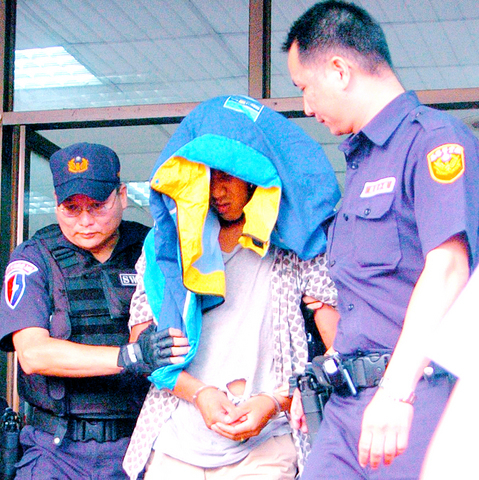A China Airlines flight from Ho Chi Minh City to the US via Taipei was forced to land at Kaohsiung International Airport yesterday after a reportedly drunken passenger broke a window and attacked flight attendants.
In a statement, China Airlines said a Vietnamese-American man identified as Danh Quinh Suot, 32, assaulted attendants and broke a window next to a seat with his elbow, prompting the plane's captain to request that the flight be diverted for safety reasons.
According to Lee Chung-rong (

PHOTO: HUANG CHI-YUAN, TAIPEI TIMES
The procedure, Lee said, was appropriate for the occasion.
Danh was drunk, the airline said, adding that no other passengers were injured in the incident.
Upon the Airbus 330's arrival in Kaohiung, both Danh and his wife were taken off the plane by aviation police for questioning.
Danh was arrested for allegedly threatening aviation safety.
Aviation police at Kaohsiung airport said that they found medication used to treat mental illness among Danh's belongings while they were questioning him.
Police later took him to a local hospital for medical and psychological examinations. Danh was accompanied by representatives from the American Institute in Taiwan, Kaohsiung Office.
The initial investigation by police found that Dahn was mentally unstable when he broke an inside window pane.
They turned over the case to the Kaohsiung District Prosecutors Office for further investigation.
Meanwhile, the China Airlines plane, flight 682, spent about two hours on the ground in Kaohsiung before continuing on to Taipei. It took off from Kaohisung around 5pm and arrived at the CKS International Airport at 5:51pm. The flight was supposed to have arrived at 3:15pm.
Family members of passengers were anxious and upset about the delay and complained that China Airlines had not immediately informed them about the incident and the diversion to Kaohsiung.
CAL spokesman Johnson Sun (孫鴻文) said the company regretted the inconvenience caused to the flight's passengers as well as the personnel in the Kaohsiung airport.
Sun emphasized that yesterday's diversion had been a flight safety issue.
"The average window is double-layered, so safety will not be threatened,'' he said.
He said passengers were not allowed to board flights if they were determined to be intoxicated or if they were mentally unstable, but airlines cannot stop someone from boarding if they do not show outward signs of impairment.
Fang Yueh-chiang (
"This was a case of an unruly passenger in the cabin," Fang said, "His behavior did not lead to a plane crash, so there is no need for us to investigate."
According to the Civil Aviation Act (

MAKING WAVES: China’s maritime militia could become a nontraditional threat in war, clogging up shipping lanes to prevent US or Japanese intervention, a report said About 1,900 Chinese ships flying flags of convenience and fishing vessels that participated in China’s military exercises around Taiwan last month and in January last year have been listed for monitoring, Coast Guard Administration (CGA) Deputy Director-General Hsieh Ching-chin (謝慶欽) said yesterday. Following amendments to the Commercial Port Act (商港法) and the Law of Ships (船舶法) last month, the CGA can designate possible berthing areas or deny ports of call for vessels suspected of loitering around areas where undersea cables can be accessed, Oceans Affairs Council Minister Kuan Bi-ling (管碧玲) said. The list of suspected ships, originally 300, had risen to about

DAREDEVIL: Honnold said it had always been a dream of his to climb Taipei 101, while a Netflix producer said the skyscraper was ‘a real icon of this country’ US climber Alex Honnold yesterday took on Taiwan’s tallest building, becoming the first person to scale Taipei 101 without a rope, harness or safety net. Hundreds of spectators gathered at the base of the 101-story skyscraper to watch Honnold, 40, embark on his daredevil feat, which was also broadcast live on Netflix. Dressed in a red T-shirt and yellow custom-made climbing shoes, Honnold swiftly moved up the southeast face of the glass and steel building. At one point, he stepped onto a platform midway up to wave down at fans and onlookers who were taking photos. People watching from inside

Japan’s strategic alliance with the US would collapse if Tokyo were to turn away from a conflict in Taiwan, Japanese Prime Minister Sanae Takaichi said yesterday, but distanced herself from previous comments that suggested a possible military response in such an event. Takaichi expressed her latest views on a nationally broadcast TV program late on Monday, where an opposition party leader criticized her for igniting tensions with China with the earlier remarks. Ties between Japan and China have sunk to the worst level in years after Takaichi said in November that a hypothetical Chinese attack on Taiwan could bring about a Japanese

STREAMLINED: The dedicated funding would allow the US to transfer equipment to Taiwan when needed and order upgraded replacements for stockpiles, a source said The US House of Representatives on Thursday passed a defense appropriations bill totaling US$838.7 billion, of which US$1 billion is to be allocated to reinforcing security cooperation with Taiwan and US$150 million to replace defense articles provided to the nation. These are part of the Consolidated Appropriation Act, which the US House yesterday passed with 341 votes in favor and 88 against. The act must be passed by the US Senate before Friday next week to avoid another government shutdown. The US House Committee on Appropriations on Monday unveiled the act, saying that it allocates US$1 billion for the Taiwan Security Cooperation Initiative